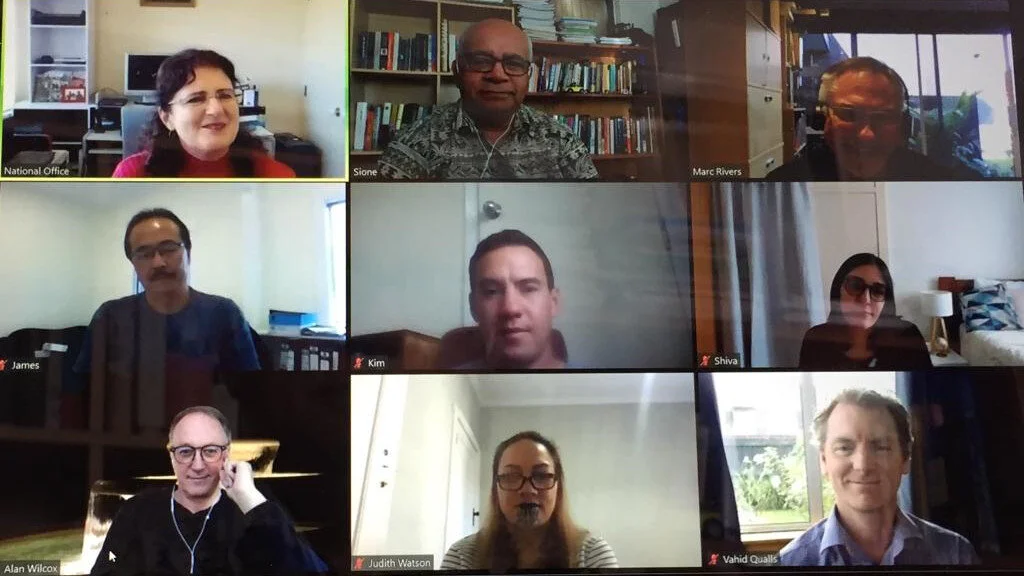Sparking constructive conversations on social media
In this year’s Ridván message, the Universal House of Justice referred to “constructive themes that are emerging from the discourses opening up” in society at the present time. An eagerness to contribute insights to various discourses is very evident amongst some of the friends in this country, especially in online spaces. As a contribution to effectiveness in this area, and avoiding pitfalls, we present here a brief compilation of relevant quotations, accompanied by questions for reflection.
The quotations and questions may be used for personal reflection or for discussions aimed at enhancing understanding of the concepts and principles involved in such matters. The quotations are just a brief selection, and you may wish to research other quotations to seek a fuller understanding. A list of sources of the quotations, and a list of further reading suggestions, are provided at the end.
Universal House of Justice, Ridván message 2020
“The expectation we expressed in our Naw-Rúz message that this test of humanity’s endurance would grant it greater insight is already being realized. Leaders, prominent thinkers, and commentators have begun to explore fundamental concepts and bold aspirations that, in recent times, have been largely absent from public discourse. At present these are but early glimmerings, yet they hold out the possibility that a moment of collective consciousness may be in view.”
(Q 1) What is happening because of the test of endurance that humanity is currently facing?
(Q 2) What may be in view as a result of a change now emerging in public discourse?
(Q 3) What might be some of the “fundamental concepts and bold aspirations” that might underpin such a collective consciousness?
Universal House of Justice, Naw Rúz message 177
“Though having to adapt to new circumstances, the believers have used creative means to strengthen bonds of friendship, and to foster among themselves and those known to them spiritual consciousness and qualities of tranquillity, confidence, and reliance on God. The elevated conversations that have occurred as a result, whether remotely or in person, have been a source of comfort and inspiration to many. Such efforts on your part provide a valuable service at this hour when many souls are perplexed and dismayed, unsure of what will be.”
(Q 4) What are some examples of themes that Bahá’ís might profitably introduce into their social media conversations? (See also, the next quotation)
Letter on behalf of the Universal House of Justice, 23 December 2008 to an individual
“Involvement in social discourse and action will at times require that Bahá’ís become associated with the development of public policy. In this regard, the term ‘policy,’ like the term ‘politics,’ has a broad meaning. While refraining from discussion of policies pertaining to political relations between nations or partisan political affairs within a country, Bahá’ís will no doubt contribute to the formulation and implementation of policies that address certain social concerns. Examples of such concerns are safeguarding the rights of women, extending effective education to all children, curbing the spread of infectious disease, protecting the environment, and eliminating the extremes of wealth and poverty.”
(Q 4, repeated) What are some examples of themes that Bahá’ís might profitably introduce into their social media conversations?
Letter on behalf of the Universal House of Justice, 27 April 2017 to an individual
“Furthermore, Bahá’u’lláh and ‘Abdu’l-Bahá enjoined Bahá’ís to be obedient to the government of their land. Unity, order, and cooperation are the basis for sound and lasting change. Even civil disobedience, in the form of a conscious decision to violate the law to effect social change, is not acceptable for Bahá’ís—whatever merit it appears to have had in particular political settings.”
(Q 5) What are the best means for creating sound and lasting change?
“Bahá’ís and Bahá’í institutions should not take positions on the political decisions of governments, including disputes among governments of different nations; should refrain from becoming involved in debates surrounding any political controversy; and should not react, orally or otherwise, in a manner that could be taken as evidence of support for a partisan political stance. It is not for a Bahá’í, in offering social commentary, to vilify specific individuals, organizations, or governments or to make attacks on them. Indeed, the Guardian specifically cautioned the friends against referring to political figures in their public remarks, whether in criticism or support.”
(Q 6) Is it ever acceptable for Bahá’ís to publicly criticise the decisions of governments?
(Q 7) Is it wise for Bahá’ís to publicly praise the decisions of governments?
“In a letter written on his behalf, Shoghi Effendi stated that individual Bahá’ís should not become immersed in the ‘faulty systems of the world’ or judge their government as ‘just or unjust—for each believer would be sure to hold a different viewpoint, and within our own Bahá’í fold a hotbed of dissension would spring up and destroy our unity.’”
(Q 8) What will happen if we take it upon ourselves to judge a government as “just or unjust”?
Letter on behalf of the Universal House of Justice, 1 December 2019, to all National Spiritual Assemblies
“It will be apparent that the precepts the friends observe in the course of their general interactions with those around them must also characterize, sometimes even more scrupulously, their communication carried out via social media. These precepts include the prohibition on backbiting, the counsel to see the world with their own eyes and not through the eyes of others, the need to uphold the oneness of humanity and avoid a mind-set of ‘us’ and ‘them’, and the principles of consultation and the necessary decorum associated with it.”
(Q 9) What precepts should we observe in our communications via social media?
Letter on behalf of the Universal House of Justice to three individuals regarding climate change, 29 November 2017
“Among the Bahá’í teachings are those concerning the importance of science. ‘Great indeed is the claim of scientists … on the peoples of the world,’ Bahá’u’lláh observed. ‘Abdu’l-Bahá wrote that the ‘sciences of today are bridges to reality’ and repeatedly emphasized that ‘religion must be in conformity with science and reason.’ Significantly, on an occasion when a scientific question was asked of Shoghi Effendi, he responded in a letter written on his behalf that ‘we are a religion and not qualified to pass on scientific matters.’ And in reply to scientific issues raised on a number of occasions, he consistently advised Bahá’ís that such matters would need to be investigated by scientists.”
(Q 10) Should we take issue with the views of scientists on religious grounds?
Letter on behalf of the Universal House of Justice to an individual, 21 February 2016
“There also may well be statements in the Writings about the material world the veracity of which will be proven by science in future. The notion of scientific ‘truth’ does not encompass every claim or theory asserted in the name of science. But while a great deal of scientific discourse is tentative and subject to change, some scientific statements are accurate and reliable descriptions of reality, and those findings are not in conflict with true religion, that is, with the Revelation and its authorized interpretations. It is for this reason that ‘Abdu’l-Bahá emphasizes that religious beliefs should be weighed in the light of science and reason, so that personal interpretations of the meaning of the Revelation, which are also fallible and subject to change, do not lead to incorrect conclusions.”
(Q 11) What means should we use to weigh our religious beliefs?
‘Abdu’l-Bahá, “The Promulgation of Universal Peace”
“God has bestowed the gift of mind upon man in order that he may weigh every fact or truth presented to him and adjudge whether it be reasonable. That which conforms to his reason he may accept as true, while that which reason and science cannot sanction may be discarded as imagination and superstition, as a phantom and not reality.”
(Q 12) What means should we use to weigh controversial theories that we see promoted by others?
Postscript: an additional question
How would you rate the constructiveness of the following types of social media posts?
(You could use a scale from 1 to 5, with “1” being unconstructive and “5” being highly constructive. Nuanced thinking on the issues involved may include considering different variations of some of these types of posts, and how to improve framing of a post in order to make it more constructive.)
A post sharing personal experiences of prayer as a means for dealing with the stresses of life.
Reposting a message from the authorities on measures to protect against spreading or contracting Covid-19.
Reposting claims from non-authoritative sources about fighting the pandemic.
Reposting a humorous meme making fun of a national leader.
Posting a charming photograph of a beautiful scene.
Tips on how to help children with online learning at home.
Reposting a news article about the alleged misdeeds of a certain country.
Reposting a conspiracy theory.
Posting an inspiring quotation from the Bahá’í Writings.
A post questioning the advice of public health authorities.
Sources of the quotations, via library.bahai.org
‘Abdu’l-Bahá, “The Promulgation of Universal Peace” — https://www.bahai.org/library/authoritative-texts/abdul-baha/promulgation-universal-peace/
Universal House of Justice, Ridván message 2020 — https://www.bahai.org/library/authoritative-texts/the-universal-house-of-justice/messages/20200420_001/1#350007392
Universal House of Justice, Naw Ruz message 177 — https://www.bahai.org/library/authoritative-texts/the-universal-house-of-justice/messages/20200319_001/1#610273755
Letter on behalf of the Universal House of Justice, 23 December 2008 to an individual — https://www.bahai.org/library/authoritative-texts/the-universal-house-of-justice/messages/20081223_001/1#317102509
Letter on behalf of the Universal House of Justice, 27 April 2017 to an individual — https://www.bahai.org/library/authoritative-texts/the-universal-house-of-justice/messages/20170427_001/1#362945323
Letter on behalf of the Universal House of Justice, 1 December 2019, to all National Spiritual Assemblies — https://www.bahai.org/library/authoritative-texts/the-universal-house-of-justice/messages/20191201_001/1#985401747
Letter on behalf of the Universal House of Justice, 21 February 2016, to an individual — https://www.bahai.org/library/authoritative-texts/the-universal-house-of-justice/messages/20160221_001/1#791507151
Some other relevant guidance
Universal House of Justice, letter to the Bahá’ís of Iran regarding several issues related to the principle of non-involvement in partisan political affairs, 2 March 2013 — https://www.bahai.org/library/authoritative-texts/the-universal-house-of-justice/messages/20130302_001/1#063389421
Universal House of Justice, letter to the Bahá’ís of the world on world peace, 18 January 2019 — https://www.bahai.org/library/authoritative-texts/the-universal-house-of-justice/messages/20190118_001/1#276724432
Letter on behalf of the Universal House of Justice to three individuals regarding climate change, 29 November 2017 — https://www.bahai.org/library/authoritative-texts/the-universal-house-of-justice/messages/20171129_001/1#665166280
Universal House of Justice, letter to the Bahá’ís of the world regarding economic life, 1 March 2017 — https://www.bahai.org/library/authoritative-texts/the-universal-house-of-justice/messages/20170301_001/1#712004157






